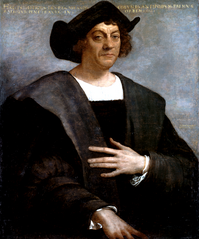My daughter has been inundated with Columbus this year, and apparently someone dressed as Columbus came to visit her school. I’m sure my son has gotten plenty too. I’ve been pondering how to de-mythologize Columbus to kids without resorting to hyperbole, facts not in evidence, retroactively imposing modern standards on him, or otherwise creating an anti-myth (I’m seeing a lot of anti-myths out there this morning, which is understandable but not how I like to do things).
Here are my initial thoughts. Remember, this is for kids. I’d love to hear your comments.
————————————–
Hi kids!
Christopher Columbus was not the first European to figure out that the earth was round, lots of people knew that. But his voyage to the Americas were the catalyst for a great age of exploration, trade, and eventually colonization by Europeans. In a very real way, this era re-shaped the world – from the languages we speak, the religions we follow, the food we eat, and the diseases we catch.
Columbus was a brave man, and like many brave men believed very strongly that he knew what he was doing – even though he was wrong about so many details – and it’s ok to be impressed by his bravery.
But it’s also important to know that as a result of Columbus’ voyage and the many trips that followed, horrible things happened. First, European diseases ripped through the Americas, killing millions of people over time. Second, Columbus believed in slavery and believed in religious conversion – so he and those like him forced native people to change their religion even if they didn’t want to. He took indigenous people, those he called Indians, as slaves and tried to bring them back to Spain or put them to work on their own islands. He crushed rebellions by committing horrific acts that we would consider war crimes today. The people who followed him, who eventually conquered Central and South America continued this trend. So many indigenous peoples died of diseases and violence, that the colonizers had to import African slaves to work in their farms.
So when you hear people praise Columbus for his bravery, you can believe it, even if he didn’t “discover” the Americas or figure out that the earth was round. He was brave. But brave people can do bad things, and worse things can happen without any planning. That’s one of the lessons of history.
————————————–
How’d I do? How can I fix it for next year?

"So many indigenous peoples died of diseases and violence, that the colonizers had to import African slaves to work in their farms." Minor hang nail with "had to import" They certainly may have needed the additional labor help, perhaps "chose to bring" I don't like "had to" and I like "import" even less even if that is how they saw it back in the day. Over all this is pretty good, I'm more interested in how you frame the follow up discussion questions. Or even perhaps exercises that help kids plan their own expeditions and the choices they would need to make along the way.
Yeah, I agree. I left it alone today, but need to make the agency of slavery clearer. There are some other tweaks for it too.
Please polish this for next year (or sooner.) We need more well-written perspectives that bridge the divide between hero and villain (right, left, and so on) – and realize that great men and women were also real men and women. It's more interesting to live in a world of real people than caricatures, anyway.
Thank you David, I will! And I'll post when I do, of course!